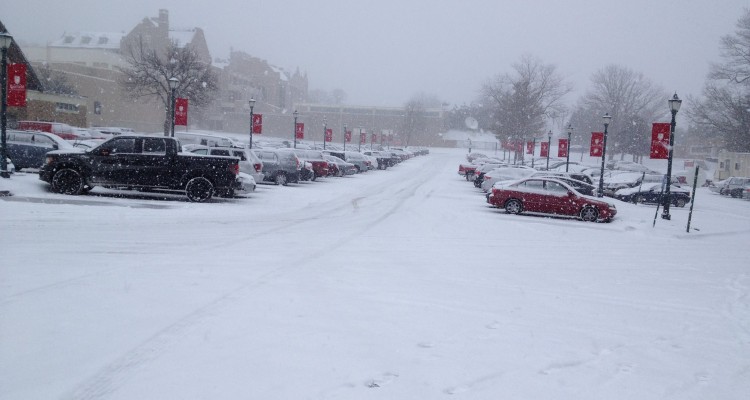By Monday morning on Feb. 3, snow had begun to laminate campus. As weather conditions started to worsen, students began to wonder whether or not classes were going to be canceled. At 1:54 p.m., students and faculty received notice via StagAlert that all classes beginning at or after 2:00 p.m. were canceled.
Senior Vice President for Administration and Chief of Staff Dr. Mark C. Reed ‘96, stated in an email that the announcement “was not timely and in that sense a better decision could have been made.”
Sophomore Drew Mignosa said that he “definitely questions how these decisions are made.” He added that, “In high school, we always had a timely notice.”
“The decision to close the University, delay, etc. is delegated to me,” Reed stated. “Whenever classes are in session … I talk with Fr. Paul Fitzgerald who is our Senior Vice President for Academic Affairs. We talk mainly about what the impact of a decision will be on classes.”
“Typically, we would announce it so that there is a gap of time between the announcement and the classes affected,” stated Reed.
Mignosa said, “Canceling classes on such short notice was unsafe. My professor had to drive here from New Haven just to turn around and drive back. There was no point in making students and faculty drive to campus, making their risky drives worthless.”
According to Reed, “The criteria to close or delay involves a variety of factors. These primarily include the conditions on campus, the conditions of the main roads and highways leading to the University from the surrounding areas and any directives or advisories from the state.”
“Advising me on the decision is a small working group that consists of the Director of Public Safety, Director of Human Resources and Director of Facilities Management,” Reed said.
Reed also stated that “Safety is a top priority … Other considerations include commuting students, faculty and staff getting to/from work, etc.” Reed added that, “You often cannot make a decision that will please everyone.”
Assistant Director of Public Safety John Ritchie said that since “Fairfield is considered a residential school, suspending operations isn’t always needed” because most students live on campus. “We try to stay open because no matter what the weather conditions are, we still have to support the resident students, so it can be better to keep everything open.”
According to Ritchie, the Department of Public Safety monitors public road conditions and weather forecasts; the input from DPS plays a large role in the decision to suspend operations on campus.
Mignosa said, “Even as a student who lives in a dorm, since pathways aren’t always shoveled it can be challenging and dangerous to walk to class.”
Senior Gianluca Iaboni said he “felt misinformed,” when he finally received the notice after driving on snowy roads for 25 minutes from his residence on Fairfield Beach Road. “If they knew they were going to cancel class, they should have done it much earlier,” said Iaboni.
Reed stated that “From personal experience, I can tell you that what may seem like easy decisions are not … I think we get it right more often than wrong, but we are making judgment calls that may negatively impact a percentage of people. In those cases, we do the best we can with the best information available to us.”


Leave a Reply